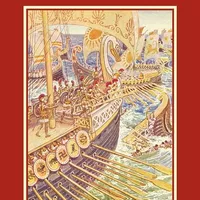14. The Story of Carthage
"Attempt not to acquire that which may not be retained." One of the largest of the Phœnician settlements was called Carthage, which was on the northern coast of Africa. There is an old legend about the founding of this ancient city which is very quaint.
One of the kings of Tyre died, leaving a son called Pygmalion and a daughter Dido, who was very beautiful. Though Pygmalion was but a boy when his father died, the Phœnicians made him king. His sister Dido married a very rich man, of whose wealth Pygmalion was very jealous. After a time he slew his brother-in-law, hoping to get the wealth he owned. But Dido hid the treasure. She was very sad and troubled, for she loved her husband, and she made up her mind to escape from the country. Taking many nobles of the city with her, she put all her riches on board one of her brother's ships and set sail for Cyprus secretly. Now, when Pygmalion found that his sister had fled, taking some of his citizens with her, he was very angry and would have pursued her, but he was hindered by the prophets, who said—
"It will go ill with thee, if thou hinder the founding of that which shall be the most fortunate city in the whole world." Then Dido sailed from Cyprus to the coast of Africa, landing some fifteen miles from Utica, which had long been a Phœnician colony. She found the natives on the coast friendly, and bought a piece of land, "so much as could be covered with the hide of an ox, that she might refresh her companions, who were now greatly wearied with their voyage." Thither came many natives bringing merchandise for sale, and very soon there grew up a large town. The people of Utica claimed kindred with the newcomers, for were they not all from the old country Phœnicia? And they built up their beautiful city, and called it Carthage. The site was well chosen. The promontory, on which it stood, afforded excellent harbours for shipping, and the Phœnician settlers, anchoring in this haven, were not slow to see its advantages.
Midway in the Great Sea, within easy reach of Spain and Sicily, this new African town was indeed to be "the most fortunate city in the whole world." Phœnicia was at the height of her power, Greece was not yet great, Rome had not risen. The great empires of the East, Egypt and Babylon, were slowly dying; Carthage was yet to rule the Great Sea and overshadow the mother country.
The city grew more and more flourishing. The beauty and fame of Dido were noised abroad until it reached the ears of the King of the Moors. He sent for the men of Carthage.
"Go back to the queen and say that I demand her hand in marriage," said the king; "and if she be not willing, then I will make war upon her and her city." But these men, fearing to give Dido the king's message, knowing the love she bore her husband, invented a crafty device. "The King of the Moors," they said, "desireth to find some one who shall teach his people a more gentle manner of life; but who shall be found that will leave his own kinsfolk and go to a barbarous people that are as the beasts of the field?" Dido reproved them.
"No man should refuse to endure hardness of life, if it be for his own country's sake: nay, he must give his very life to it, if need be," she answered, with a patriotism rare in those early days. Then the men of Carthage answered—
"Thou art judged out of thine own mouth, O queen. What therefore thou counsellest to others, do thyself, if thou wouldst serve thy country." Dido had fallen into her own trap. She was very unhappy.
"Give me the space of three months," she said, "that I may lament my former estate." Then she went to the farthest part of the city—the city of her own founding, destined to such great things. She had built a great funeral-pile, and one day she herself mounted it to the top, having a drawn sword in her hand.
Looking down upon the Carthaginians, who were gathered round, she cried aloud with a resolution born of despair—
"Ye bid me go to my husband. See, then, I go." Thereupon she drove the sword into her heart, and fell down dead. Such is the legend of the founding of Carthage.

